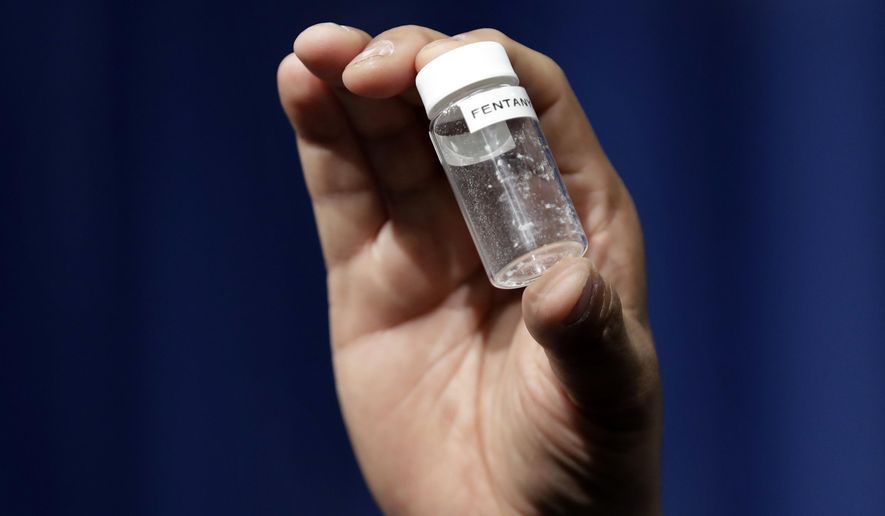‘World’s largest drug dealer’: U.S. set to sanction China over fentanyl scourge
DEA temporary drug scheduling safeguards set to expire.

An example of the amount of fentanyl that can be deadly after a news conference about deaths from fentanyl exposure, at DEA Headquarters in Arlington Va. (AP Photo/Jacquelyn Martin, File)
The U.S. is stemming the flow of opioid painkillers, but Washington remains nervous about deadly synthetics like fentanyl, saying federal safeguards will expire in February and China should be sanctioned if it doesn’t rein in the No. 1 killer in the U.S. drug crisis.
White House drug policy officials, meanwhile, are telling everyone they meet about fentanyl’s deadly potency, warning it could be “one and done” even for intermittent users.
The U.S. is starting to get a better handle on a still-deep drug crisis, with fatal overdoses dropping from about 70,200 in 2017 to roughly 68,000 in 2018, according to provisional federal data.
Users often don’t realize that traffickers are cutting heroin, cocaine and other drugs with the deadly synthetic opioid.
Sen. Rob Portman, an Ohio Republican who is at the forefront of the opioids fight, says Congress should immediately take the crucial first step of permanently scheduling all forms of illicit fentanyl.
Under the Controlled Substance Act, drugs are scheduled or categorized to prioritize law enforcement action.
The Drug Enforcement Administration issued a temporary scheduling order that allows prosecutors to pursue criminal charges against anyone who manufactures, distributes or handles fentanyl-related substances.
The order is set to expire on Feb. 6, so Mr. Portman is pushing the FIGHT Act with Sen. Joe Manchin III, West Virginia Democrat, to make fentanyl illegal in all its forms.
Class-wide scheduling has streamlined the legal process so that policymakers don’t have to ban each analog of fentanyl individually. Failure to renew the scheduling would incentivize traffickers to chemically manipulate their forms of fentanyl in a way that skirts the law.
A coalition of all 56 state and territorial attorneys general endorsed the measure in a Dec. 11 letter to leaders of the Senate Judiciary Committee. They cited a massive November bust in Ohio that netted 20 kilograms of fentanyl that was laced with carfentanil, an even more powerful synthetic opioid.
“The potency of the fentanyl-related substances in this single bust was enough to kill every man, woman, and child in the state of Ohio several times over,” they wrote.
Another get-tough measure made it into law as part of a defense authorization bill this month.
The measure from Senate Minority Leader Charles E. Schumer, New York Democrat, and Sen. Tom Cotton, Arkansas Republican, would allow the administration to sanction manufacturers and traffickers of fentanyl in other countries. The bill is particularly aimed at China, which pledged to crack down on domestic labs that are responsible for much of fentanyl flooding U.S. communities.
Mr. Schumer and Mr. Cotton aren’t ideological soul mates, per se, but they’re both tough on China. Mr. Cotton’s office said the senators brainstormed the legislation in the Senate gym, where they both like to work out in the morning.
“The Chinese government is the world’s largest drug dealer,” Mr. Cotton said. “China has allowed fentanyl and other synthetic opioids to pour into the United States for years, killing tens of thousands of Americans. Our law enforcement and intelligence agencies need additional resources to target the fentanyl producers, traffickers, cartels, and other criminals who are funneling this poison across our borders and into our communities.”
Reps. Vern Buchanan, Florida Republican, and Seth Moulton, Massachusetts Democrat, sponsored a similar measure in the House.
“I love it. It comes from the Congress, so it is the people telling China to stop it,” said Michael Gray, who started the Actus Foundation to spotlight the synthetic-drug crisis after his daughter, Amanda, died from a dose of pure fentanyl.
She was not addicted to any drug but self-medicated intermittently for a diagnosed mental illness. The night she died, what she thought was heroin turned out to be a lethal dose of pure fentanyl.
As her parents grieved, they looked around and realized no one was advocating for people who weren’t addicted but who have been swept up unwittingly in the deadly fentanyl wave.
“It’s a paradigm shift,” Mr. Gray told The Washington Times. “If my daughter did exactly what she did in exactly the way she did it in 2012 or back, she’d be alive today.”
James Carroll, director of the White House Office of National Drug Control Policy, mentions the “One and Done” concept in nearly every public forum and interaction with people on the front lines of the drug crisis. He wants every American to take heed, especially young people who more often experiment with drug use, according to agency spokesman Peter Hoffman.
“‘One and Done’ is an effective message that we need to be bringing to young people all around the country,” Mr. Hoffman said. “For earlier generations, it may have been less risky to experiment with substances, but that is not the case today. There are thousands of heartbreaking stories that involve someone trying a drug one time and it being fatal because of what was in the substance.”
Source: https://www.washingtontimes.com/news/2019/dec/26/chinese-fentanyl-us-crosshairs-dea-safeguards-set-/